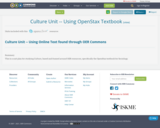
This is a unit plan for studying Culture, based and framed around OER resources, specifically the OpenStax textbook for Sociology.
- Subject:
- Social Science
- Material Type:
- Unit of Study
- Date Added:
- 01/29/2018

This is a unit plan for studying Culture, based and framed around OER resources, specifically the OpenStax textbook for Sociology.

The laws that govern and the social norms that regulate society are not always fair, legal, moral, or ethical. What is a person to do about all this injustice? What are the hazards of righting injustices or changing social norms? And what are the dangers of doing nothing?
ACCOMPLISHMENTS
Students read and annotate Antigone, “Letter from a Birmingham Jail,” and Pygmalion.
Students write a literary analysis showing the effect of social class or the law on a character’s life.
GUIDING QUESTIONS
These questions are a guide to stimulate thinking, discussion, and writing on the themes and ideas in the unit. For complete and thoughtful answers and for meaningful discussions, students must use evidence based on careful reading of the texts.
How do social class and legal institutions shape literary characters’ lives (and presumably our lives)?
How does social class affect a person in dealing with the law (protect a person, hurt a person)?
How is social class determined in America and in other places in the world?
BENCHMARK ASSESSMENT: Cold Read
During this unit, on a day of your choosing, we recommend you administer a Cold Read to assess students’ reading comprehension. For this assessment, students read a text they have never seen before and then respond to multiple-choice and constructed-response questions. The assessment is not included in this course materials.

How and why do we participate in public life? How do we get drawn into community and political affairs? In this course we examine the associations and networks that connect us to one another and structure our social and political interactions. Readings are drawn from a growing body of research suggesting that the social networks, community norms, and associational activities represented by the concepts of civil society and social capital can have important effects on the functioning of democracy, stability and change in political regimes, the capacity of states to carry out their objectives, and international politics.

This course explores the foundations of policy making in developing countries. The goal is to spell out various policy options and to quantify the trade-offs between them. We will study the different facets of human development: education, health, gender, the family, land relations, risk, informal and formal norms and institutions. This is an empirical class. For each topic, we will study several concrete examples chosen from around the world. While studying each of these topics, we will ask: What determines the decisions of poor households in developing countries? What constraints are they subject to? Is there a scope for policy (by government, international organizations, or non-governmental organizations (NGOs))? What policies have been tried out? Have they been successful?
MITx Online Version
This course is part of the Micromaster’s Program in Data, Economics, and Design of Policy through MITx Online. The course is entirely free to audit, though learners have the option to pay a fee, which is based on the learner’s ability to pay, to take the proctored exam, and earn a course certificate. To access the course, create an MITx Online account and enroll in the course 14.740x Foundations of Development Policy.
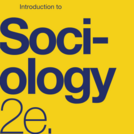
Introduction to Sociology 2e adheres to the scope and sequence of a typical, one-semester introductory sociology course. It offers comprehensive coverage of core concepts, foundational scholars, and emerging theories, which are supported by a wealth of engaging learning materials. The textbook presents detailed section reviews with rich questions, discussions that help students apply their knowledge, and features that draw learners into the discipline in meaningful ways. The second edition retains the book’s conceptual organization, aligning to most courses, and has been significantly updated to reflect the latest research and provide examples most relevant to today’s students. In order to help instructors transition to the revised version, the 2e changes are described within the preface.
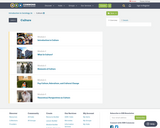

Understand how values and beliefs differ from normsExplain the significance of symbols and language to a cultureExplain the Sapir-Whorf hypothesisDiscuss the role of social control within culture

Surveys social psychology and organization theory interpreted in the context of the managerial environment. Shares lectures with 15.301, with a separate recitation required. 15.301 is intended primarily for non-Sloan students, both graduate and undergraduate. Deals with a number of diverse subjects, including motivation and reward systems for engineers and scientists in industry; the aging of technical groups; the management of R&D matrix organizations; and the architecture of R&D laboratories and its effect on communication patterns in the organization.
15.301 is a core subject for students majoring in management science. A laboratory is a required element of the course for these students. It involves projects of an applied nature in behavioral science. Emphasizes use of behavioral science research methods to test hypotheses concerning organizational behavior. Instruction and practice in communication include report writing, team decision-making, and oral and visual presentation.

We function in our personal and professional lives based on knowledge and intuitions. Our intuition that we know a lot is very powerful. But sometimes intuitions are accurate and sometimes they are not; without research, it is hard to tell.
This course combines a few different goals: develop a critical eye for making inferences from data; be able to carry out simple data analysis; learn about managerial psychology; develop interesting new questions about managerial psychology and test these questions.

Metaethics from a First Person Standpoint addresses in a novel format the major topics and themes of contemporary metaethics, the study of the analysis of moral thought and judgement. Metathetics is less concerned with what practices are right or wrong than with what we mean by ‘right’ and ‘wrong.’
Looking at a wide spectrum of topics including moral language, realism and anti-realism, reasons and motives, relativism, and moral progress, this book engages students and general readers in order to enhance their understanding of morality and moral discourse as cultural practices. Catherine Wilson innovatively employs a first-person narrator to report step-by-step an individual’s reflections, beginning from a position of radical scepticism, on the possibility of objective moral knowledge. The reader is invited to follow along with this reasoning, and to challenge or agree with each major point. Incrementally, the narrator is led to certain definite conclusions about ‘oughts’ and norms in connection with self-interest, prudence, social norms, and finally morality. Scepticism is overcome, and the narrator arrives at a good understanding of how moral knowledge and moral progress are possible, though frequently long in coming.
Accessibly written, Metaethics from a First Person Standpoint presupposes no prior training in philosophy and is a must-read for philosophers, students and general readers interested in gaining a better understanding of morality as a personal philosophical quest.

Topic 10: Social PsychologyTextbook readings: pp. 409-410; pp. 417-418; pp. 428-429; pp. 441-443.Watch: [Descriptions from the website]Milgram Obedience Study - Why should you question authority? The answer lies within this ground breaking social psychology experiment by Stanley Milgram regarding human behavior and authority.The Stanford Prison Experiment - The Stanford Prison Experiment, a dramatic simulation study of the psychology of imprisonment and one of the best known psychology experiments ever undertaken.Dr. Zimbardo takes us through the Stanford Prison Experiment, in which healthy college students are transformed into unstable prisoners and brutal prison guards within days by the power of the situation in which they found themselves.Learning objectives:1. Define social psychology.2. Describe Zimbardo’s Stanford Prison Experiment and its results. Note how social roles, norms and scripts may have affected human behavior in this study.3. Describe Milgram’s Obedience to Authority Experiment and its results.4. Describe how the “bystander effect” and “diffusion of responsibility” may have influenced the Kitty Genovese event.5. Describe how prosocial behavior, altruism and empathy are related to one another.
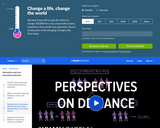
When a norm is violated, it's referred to as deviance. And though the word, deviance, seems negative, it's not. It simply means that an individual's behaving differently from what society feels is normal behavior.
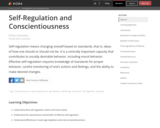
Self-regulation means changing oneself based on standards, that is, ideas of how one should or should not be. It is a centrally important capacity that contributes to socially desirable behavior, including moral behavior. Effective self-regulation requires knowledge of standards for proper behavior, careful monitoring of one’s actions and feelings, and the ability to make desired changes.
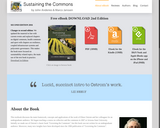
In this book you will learn about institutions–the rules and norms that guide the interactions among us. Those rules and norms can be found from traffic rules, rules in sports, regulations on when and where alcohol can be consumed, to constitutional rules that define who can become president of the United States of America. Rules and norms guide us to cooperative outcomes of so-called collective action problems. If we rely on voluntary contributions only to get anything done, this may not lead to the best results. But research also shows that coercion of people to comply to strict rules do not necessary lead to good outcomes. What combination of sticks and carrots is needed to be successful to solve collective action problems such as sustaining the commons?